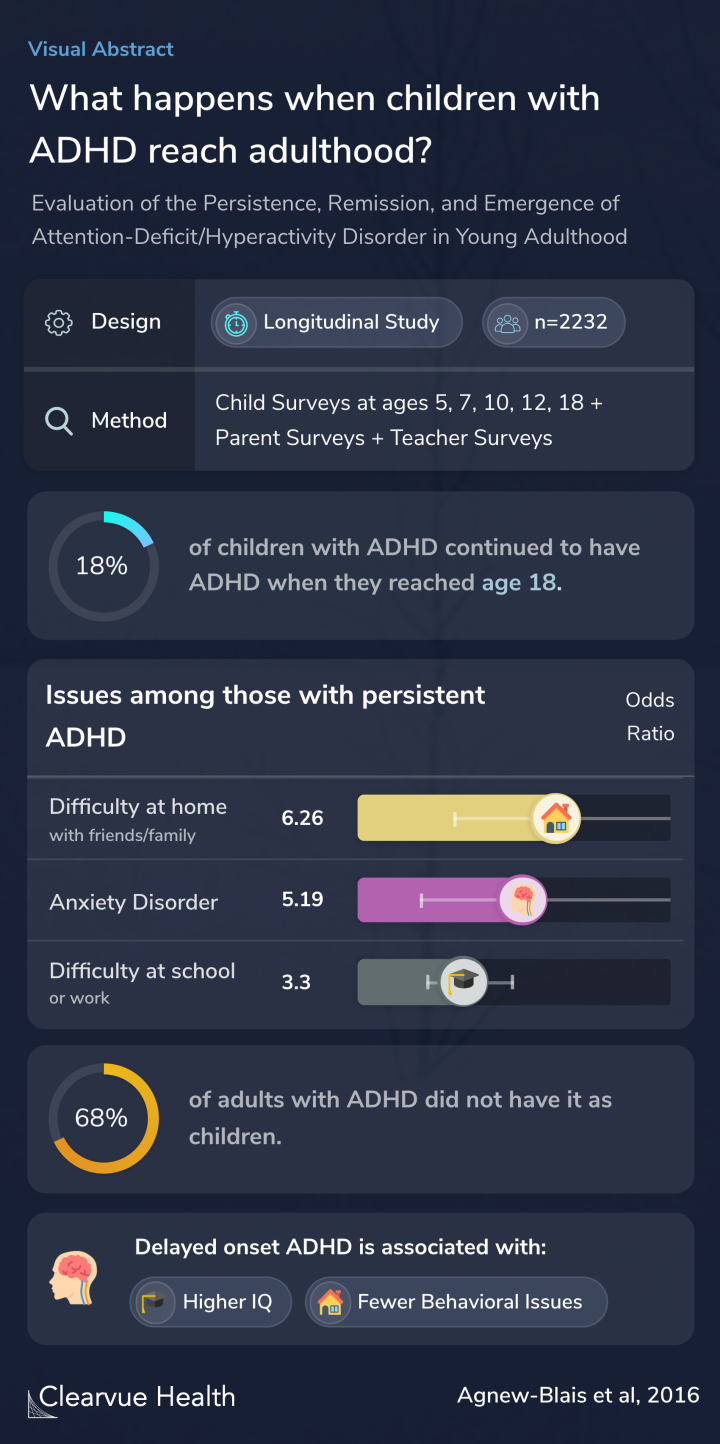Evaluation of the Persistence, Remission, and Emergence of Attention-Deficit/Hyperactivity Disorder in Young Adulthood
Persistent and Late Onset ADHD
Jessica C Agnew-Blais , Guilherme V Polanczyk , Andrea Danese , Jasmin Wertz , Terrie E Moffitt , Louise Arseneault


Background
ADHD is believed to start when we’re children or teenagers. But it can persist into adulthood. Some people also develop it later in life.
The researchers in this study wanted to see which risk factors were linked with ADHD persisting into adulthood. They also wanted to study the impacts of having ADHD as an adult.
Objective: To investigate childhood risk factors and young adult functioning of individuals with persistent, remitted, and late-onset young adult ADHD...
Methods
The researchers conducted this study on 2232 twins in the UK. They evaluated the participants for ADHD throughout their childhood and age 18.
They evaluated their ADHD symptoms, their functioning in everyday life, and whether they had other mental health disorders.
They also surveyed their parents and teachers. Often, parents and teachers can notice symptoms of ADHD that patients may not see in themselves.
Design, setting, and participants: The study sample was the Environmental Risk (E-Risk) Longitudinal Twin Study, a nationally representative birth cohort of 2232 twins born in England and Wales from January 1, 1994, to December 4, 1995. Evaluation of childhood ADHD (ages 5, 7, 10, and 12...
Results
Overall, 22% of the children with ADHD in the study continued to have ADHD at age 18. The rest no longer had symptoms or did not have symptoms severe enough to meet the criteria for ADHD by the time they grew up.
As a group, those who continued to have ADHD when they reached adulthood tended to have more issues in their personal and professional lives.
They were several times more likely to experience difficulty at home or school compared to those whose ADHD was resolved.
They were also more likely to have anxiety and marijuana dependence.
Around 68% of those with adult ADHD in the study did not have ADHD as children.
These individuals had a markedly different profile than those who got ADHD as children.
They were significantly more likely to have a high IQ than a similarly-aged person with persistent childhood ADHD.
They were also significantly less likely to have behavioral issues.
Results: Of 2232 participants in the E-Risk Study, 2040 were included in the present analysis. In total, 247 individuals met diagnostic criteria for childhood ADHD; of these, 54 (21.9%) also met diagnostic criteria for the disorder at age 18 years. Persistence was associated with more sy...
Conclusions
This study concluded that not every person with ADHD as a young adult is the same. Some have ADHD that developed when they were children. Others had ADHD that developed when they were young adults. Both groups were affected by their ADHD. However, some evidence suggests that those who develop ADHD later in life have better outcomes.
Conclusions and relevance: We identified heterogeneity in the DSM-5 young adult ADHD population such that this group consisted of a large, late-onset ADHD group with no childhood diagnosis, and a smaller group with persistent ADHD. The extent to which childhood-onset and late-onset adult...